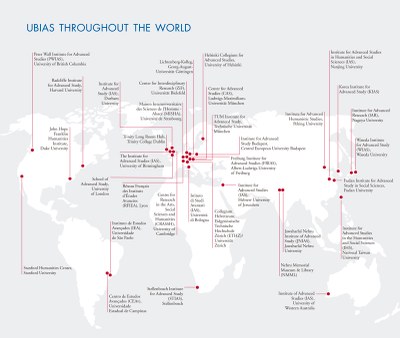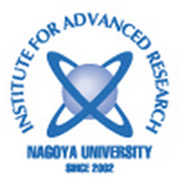Organizers
 | |
|---|---|
 |
UBIAS stands for “University-Based Institutes for Advanced Study”. Unlike traditional Institutes for Advanced Study, UBIAS are associated with or embedded within a university, and actively contribute to the academic culture and the scientific achievements of their home university. By offering various fellowship programmes on different academic levels (junior and senior researchers), UBIAS institutes bring together outstanding researchers from different disciplines, nationalities and academic backgrounds, creating a productive environment for innovative research. These common characteristics have proved to be a fruitful basis for mutual exchange, although the individual institutes display a large variety of different concepts and academic pursuits. With their individual profiles, they answer to the specific needs and strengths of their affiliate university. While many institutes have traditionally concentrated on humanities and social sciences, an increasing number of institutes now incorporate theoretical and experimental sciences. (from www.ubias.net) Current members |
| UBIAS throughout the world |
 |
Since its foundation in 1986, the IEA-USP has provided the academic community and the general public with the opportunity to establish direct contact with the ideas of several Brazilian and foreign personalities from scientific and cultural areas. It has also produced essential proposals for the economic, social, and cultural development of Brazil. Due to the peculiarities of its objectives, the IEA-USP has an academic and administrative structure that differs from the usual standard adopted by most of the university institutions. The emphasis on the debate of interdisciplinary themes makes the IEA-USP able to act in the definition of research and public policy directives, but not in educating researchers or executing experimental projects. That is the reason why the IEA-USP does not offer undergraduation or graduation programs, does not have a permanent board of researchers and does not possess laboratories.
|
 |
Nagoya University’s Institute for Advanced Research was established according to the University’s Academic Charter in 2002 to produce internationally recognized academic research of the highest caliber, and to contribute to society through the research achievements at the Institute. Nagoya University was a leader among Japanese universities in creating such a new academic organization. To promote the academic development of Nagoya University, the Institute for Advanced Research has three principal functions:
(from http://www.iar.nagoya-u.ac.jp/~iar)
|
Sponsor
 |
Itaú Cultural is an institute dedicated to the research and production of content as well as mapping, fostering and dissemination of artistic and intellectual expressions. In this way, it contributes to the enhancement of the culture of a society as complex and diverse as Brazil. By considering culture a key tool to the construction of the country’s identity and an effective means to promote citizenship, Itaú Cultural seeks to democratize and encourage social participation. A center of cultural reference, for 27 years the institute has been promoting and propagating the Brazilian output – both in and out of the country. |
Supporters
 |
FAPESP is a public foundation, funded by the taxpayer in the State of São Paulo, with the mission to support research projects in higher education and research institutions, in all fields of knowledge. São Paulo has a population of forty million and generates 35% of Brazil’s GNP. The constitution of the State establishes that 1% of all state taxes belong to the foundation and the government transfers these funds monthly. The stability of the funding and the autonomy of the foundation allow for an efficient management of the resources that has had a sizable impact: while São Paulo has 22% of the Brazilian population and 30% of the scientists with a doctorate in the country, the state responds for 52% of the country’s scientific articles published in international journals. The Foundation works in close contact with the scientific community: all proposals are peer reviewed with the help of area panels composed of active researchers. Besides funding research in all fields, the foundation supports large research programs in Biodiversity, Bioenergy, Global Climate Change, and in Neurosciences. |
 |
The National Council for Scientific and Technological Development (CNPq), an agency of the Ministry of Science, Technology and Innovation (MCTI), has as its main duties to foster scientific and technological research and to encourage the formation of Brazilian researchers. Created in 1951, it plays an important role in the formulation and conduction of policies for science, technology and innovation. Its performance contributes to the national development and the recognition of research institutions and Brazilian researchers by the international scientific community. To learn more about the CNPq please access the Organization Chart and the Internal Regulations of the Institution. |
 |
The Freiburg Institute for Advanced Studies is the international research college of the University of Freiburg. As an integral part of the university, the Institute unites under its roof the humanities and social sciences, medicine, the natural and life sciences, and engineering. FRIAS offers leading academics (Senior Fellows) as well as outstanding early-stage researchers (Junior Fellows) from Freiburg and around the world the opportunity to concentrate exclusively on their (individual or joint) research projects for a certain period of time. It is in this way that the Institute creates a unique space and atmosphere for research within the university, enriches the global network of Freiburg-based researchers, and enhances the international visibility of the research conducted at the University of Freiburg. Particular attention is paid to promoting promising young academics, with FRIAS creating ample opportunities for them to build international networks by engaging in inspirational discussions and collaborative research with the members of the Fellow community across disciplines and (not just academic) cultures. FRIAS invites renowned scholars from around the world to Freiburg, offering a setting in which they can dedicate themselves to an inspiring research project or publication of their choice. Here, they are provided with a stimulating working environment, comprehensive support for their project, quiet offices meeting their individual demands as well as access to extremely well-equipped labs. |
 |
The Waseda Institute for Advanced Study was established in September 2006 for the purpose of achieving the following goals: rejuvenate Waseda University’s system for nurturing talent, and upgrade its research capabilities. Training young researchers to become pioneers on the frontiers of research and promoting active exchanges with foreign researchers will be important strategies for achieving these goals. WIAS is distinguished by two important features: it is independent from the other departments and institutes of Waseda University, and it emphasizes interdisciplinary research through dialogue between the humanities, social sciences, and natural sciences. Since its establishment, WIAS has hired around 10 young researchers annually on term-limited contacts. From 2007, WIAS has received science and technology promotion grants from the Ministry of Education, Culture, Sports, Science, and Technology (MEXT) and has implemented a Tenure-Track Program for researchers in the natural sciences, which has opened a pathway for WIAS researchers to become tenured members of Waseda University’s faculty after passing mid-stage and final evaluations. WIAS invites researchers from abroad who work on the cutting edge of their fields as Senior Research Fellows, and grants joint appointments to outstanding researchers within Waseda University. |
 |
The Center for Advanced Studies at Ludwig-Maximilians-Universität München (LMU) is a forum for intensive interdisciplinary academic exchange. It promotes cooperation between outstanding researchers from various LMU departments and fosters participation of visiting scholars in research and academic life at LMU. Founded in the course of the Excellence Initiative, CAS's purpose is not only to support the research activities of Ludwig-Maximilians-Universität but also to emphasize the concept of a university in its broadest sense – that is, as a "universitas" which covers all disciplines. This purpose is likewise expressed by the tree of knowledge in the CAS emblem. In contrast to traditional "Institutes for Advanced Study", CAS is not a separate academic facility but an institution which brings together outstanding LMU researchers as Members. At CAS, members are stimulated and supported to realize innovative and cooperative research projects. CAS staff prepares and organizes conferences and regular working groups. To cultivate academic exchange, CAS members are encouraged to invite outstanding researchers from Germany and abroad for short-term visits. One of CAS's most important tasks is to promote junior researchers. Promising young scholars are appointed as members of CAS's Young Academy, where they profit from interdisciplinary communication and the experience of senior CAS members. Moreover, CAS's academic coordinators support junior members to organize events tailored to their career needs and to develop interdisciplinary projects such as junior research groups. |
Partner
 |
Coursera is an education platform that partners with top universities and organizations worldwide to offer free courses online for anyone to take. It's mission is to provide universal access to the world’s best education. Learn more: www.coursera.org At Intercontinental Academia: Designing a MOOC on time with Course Success Team of Coursera |
